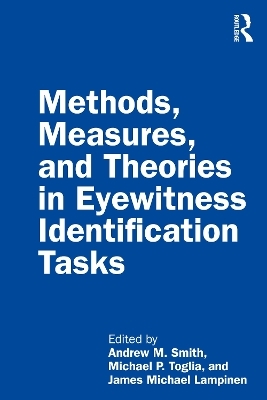
Methods, Measures, and Theories in Eyewitness Identification Tasks
Routledge (Verlag)
978-1-138-61254-9 (ISBN)
Over the past 40 years, the field of eyewitness science has seen substantial advancement in eyewitness identification procedures, yet theoretical and methodological developments have fallen behind. Featuring contributions from prominent international scholars, this book examines methodological and theoretical limitations and explores important topics, including how to increase the accuracy of identifying perpetrators when using CCTV images, how to create more identifiable facial composites, and the differences in accuracy between younger and older eyewitnesses.
Providing in-depth discussion on the limitations of traditional lineups, eyewitness memory fallibility, and the complications that arise when using laboratory simulations, along with suggestions for new methods, this book will be an invaluable resource for researchers in eyewitness recognition, lawyers, players in the criminal justice system, members of innocence commissions, and researchers with interests in cognitive psychology.
Andrew M. Smith is Assistant Professor of Psychology at Iowa State University. Andrew’s research on eyewitness memory has been published in several top psychology outlets and has attracted funding from the Laura and John Arnold Foundation, the Natural Sciences and Engineering Research Council of Canada, and the National Science Foundation. Michael P. Toglia is Human Development Professor at Cornell University. His extensive publications on adult cognition topics and lifespan themes in eyewitness memory include 11 books, most recently The Elderly Eyewitness in Court. Toglia is a Fulbright Scholar and a Fellow in several professional societies, including APA’s Division 41, Psychology and the Law. James Michael Lampinen is Distinguished Professor of Psychological Science at the University of Arkansas. Dr. Lampinen’s work focuses on applications of basic research on memory and face perception to legal issues including eyewitness identification, missing and wanted persons, and forensic age progression. He is author of two books, The Psychology of Eyewitness Identification, and Memory 101.His work has been funded by grants from the National Science Foundation and the Laura and John Arnold Foundation.
Introduction
1. Toward the Development of a More Methodologically Rigorous Eyewitness Science (Michael P. Toglia, Andrew M. Smith, & James Michael Lampinen)
Finding Persons
2. A Proposed Solution to the Problem of Identifying people from CCTV and Other Images (Richard I. Kemp, Gary Edmond, & David White)
3. Forensic Facial Composites (Charlie D. Frowd)
4. Methodological Considerations in Prospective Person Memory (Kara N. Moore, Andrew C. Provenzano, William Blake Erickson, & James Michael Lampinen)
Identifying Persons
5. Methodological Considerations in Eyewitness Identification Experiments (Adele Quigley-MacBride & Gary L. Wells)
6. Concepts and Theories That (Should) Inform the Use of Face Images in Forensic Science (Vicki Bruce & Karen Lander)
7. A Process Perspective: The Importance of Theory in Eyewitness Identification Research (Rachel E. Dianiska, Krista D. Manley, & Christian A. Meissner)
8. Measuring Performance from Eyewitness Identification Procedures (Andrew M. Smith, Laura Smalarz, & Shaela T. Jalava)
9. Ratings-Based Identification Procedures (James D. Sauer & Neil Brewer)
10. Dealing with Data from Real Witnesses: Methodological and Analytical Considerations (Ruth Horry & Daniel B. Wright)
11. Measuring the Relationship Between Eyewitness Identification Confidence and Accuracy (Neil Brewer, Carmen A. Lucas, James D. Sauer, & Matthew A. Palmer
12. Utility Approaches and Eyewitness Identification Reforms (James Michael Lampinen, Brittany Race, Andrew Provenzano, Nia Gipson, & Amber Giacona)
13. Eyewitness Identification Around the World (Ryan J. Fitzgerald, Eva Rubínová, & Stefana Juncu)
Special Considerations for Older and Younger Eyewitnesses
14. False Memory: What are the Effects, How Does Fuzzy-Trace Theory Predict Them, and How Does this Matter for Eyewitness Testimony? (Daniel M. Bialer, Valerie F. Reyna, & Charles J. Brainerd)
15. Methodological Considerations for Lifespan-Focused Identification Research (Joanna Pozzulo, Emily Pica, & Chelsea Sheahan)
Conclusion
16. Eyewitness Memory: The Next 40 Years (James Michael Lampenin, Andrew M. Smith, & Michael P. Toglia)
| Erscheinungsdatum | 26.02.2021 |
|---|---|
| Zusatzinfo | 25 Tables, black and white; 18 Line drawings, black and white; 14 Halftones, black and white; 32 Illustrations, black and white |
| Verlagsort | London |
| Sprache | englisch |
| Maße | 152 x 229 mm |
| Gewicht | 562 g |
| Themenwelt | Geisteswissenschaften ► Psychologie ► Allgemeine Psychologie |
| Geisteswissenschaften ► Psychologie ► Biopsychologie / Neurowissenschaften | |
| Geisteswissenschaften ► Psychologie ► Verhaltenstherapie | |
| ISBN-10 | 1-138-61254-5 / 1138612545 |
| ISBN-13 | 978-1-138-61254-9 / 9781138612549 |
| Zustand | Neuware |
| Informationen gemäß Produktsicherheitsverordnung (GPSR) | |
| Haben Sie eine Frage zum Produkt? |
aus dem Bereich


